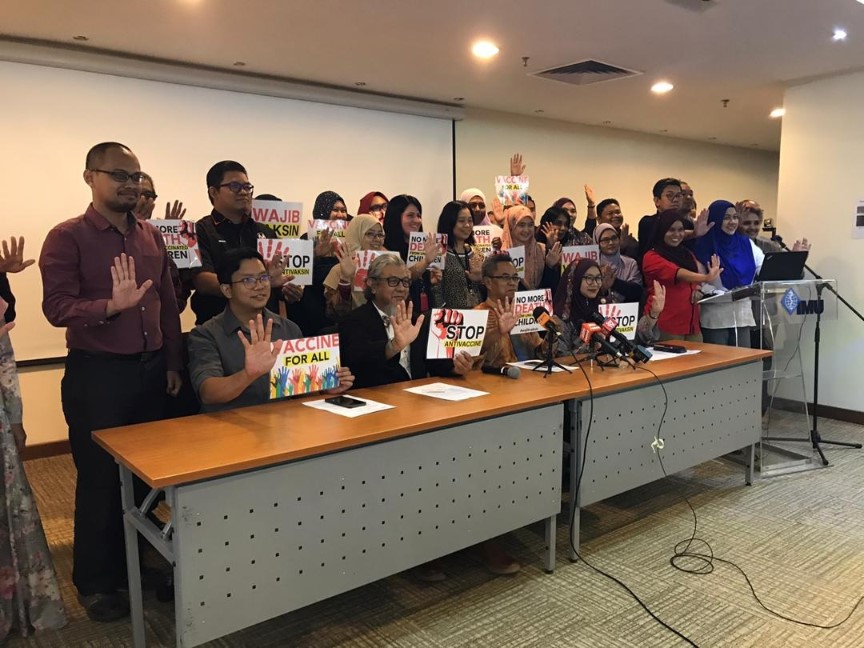KUALA LUMPUR, Jan 23 — Pro-vaccination activists today called for compulsory vaccination, legal action against vaccine-hesitant parents, and free vaccines for foreign children.
Twenty-two medical groups, civil societies, associations, universities, and think tanks, led by the Malaysian Public Health Specialists Association (PPPKAM), pointed out that vaccination has contributed to the eradication of several diseases.
Describing it as the most cost-effective way of reducing incidences of vaccine-preventable diseases, PPPKAM president Dr Zainal Ariffin Omar noted that vaccination has also reduced global child mortality rates worldwide and lifelong disabilities and birth defects.
However, despite this, anti-vaxxers are getting more organised, vocal, influential, and is now a “growing threat” in the control of vaccine-preventable diseases, particularly in Malaysia, Dr Zainal lamented.
“The anti-vaccine movement in Malaysia is using social media, public event(s), publications, (and) collaborating with health care providers and registered NGOs,” he told a press conference at the International Medical University (IMU) in Bukit Jalil here.
This is why the Malaysian National Immunisation Programme remains challenging to fully enforce, he said, noting that the situation is not unique to Malaysia specifically as vaccine hesitancy has been identified as one of the 10 global public health threats by the World Health Organization (WHO).
“We urge the government to take stern action using law, regulation, and policies, against the anti-vaccine movement,” he said.
Dr Zainal called on the government to do better in communicating to the public about vaccine-preventable diseases and its complications, adding that all children, regardless of citizenship status, have a right to be protected via immunisation.
The 22 groups’ call comes in light of the polio outbreak in Malaysia that has highlighted the dire consequences of non-vaccination.
Three children in Sabah have contracted polio, two of whom were foreigners. None of the children completed the full three rounds of polio vaccination, which gives children an almost 100 per cent protection rate against polio.
However, none of the vaccines in the country’s immunisation schedule, including the inactivated polio vaccine, are mandatory, despite the diseases in the schedule being either life-threatening or potentially crippling.
While vaccination is free of charge at all government health facilities for Malaysians, non-Malaysians are charged a minimal fee, effective from 2015, which could see foreigners, especially those not so well off, hesitate to get vaccinated.
Dr Zainal and the 22 groups called for the enactment of a relevant and enabling legislation for mandatory vaccination through a multi-agency approach to solve the matter, branding the current Fee Act 2015 as “challenging” in ensuring proper immunisation coverage in vulnerable groups.
“Review and amend the Fee Act 2015 as necessary,” he said. “(It) presents obstacles and challenges in ensuring effective immunisation coverage (in) vulnerable population(s), specifically migrants and undocumented communities.”
The government has also been urged to subsidise vaccines for all children, and band together with the private sector and NGOs to increase vaccine and vaccination literacy among the general public so they are more aware of the matter.
Besides this, the groups said the government should further increase resources to support enforcement efforts by the Ministry of Health (MOH) in the regulation of service delivery, as well as align government policies with health concerns when it comes to border protection in high-risk areas.
Among the groups that supported Dr Zainal’s calls today are IMU, the Galen Centre for Health and Social Policy, the Federation of Malaysian Consumers (Fomca), Medical Mythbusters Malaysia, Public Health Malaysia, and the Malaysian Medical Association Public Health Society.
It remains to be seen, however, whether the government will make vaccination compulsory. Deputy Health Minister Dr Lee Boon Chye last year said that there is no need for his ministry to do so, despite calls from medical associations.
He had said that the immunisation rate for all vaccines nationwide has reached above 95 per cent following education campaigns, after the vaccination rate for measles, mumps and rubella (MMR) previously dropped to below that percentage point last year that is required for herd immunity.
Asked to comment on this, Dr Zainal said data is one thing, and the reality is a completely different scenario.
“We have to make (the immunisation rate) higher because the coverage is not enough; that’s why we still have pocket(s) of problems,” he told CodeBlue.
“(The 95 per cent immunisation rate) is (a) general statistic…In reality, we have many problems, so we have to tackle that.”








